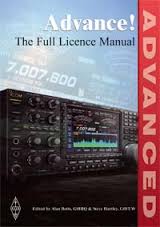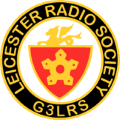Although we do not offer an Advanced course at the Leicester Radio Society, we can provide assistance where required and as a registered test centre, we can arrange your examination.
Unlike the Foundation and Intermediate level licenses, there is no requirement to take a formal training course as the exam is entirely theory based, with no practical assessments. You must be prepared to invest a significant amount of time to achieve your Advanced license though as the exam is complex and technical. Once you have successfully completed your Advanced exam, you are a 'full' licensee and can apply for your full callsign of the form M0XXX
Once you have successfully completed your Advanced exam, you are a 'full' licensee and can apply for your full callsign of the form M0XXX
There are a number of online resources that you can use to assist your study but we would recommend purchasing 'Advance! The Full License Manual'which is available from the RSGB website http://www.rsgb.org.uk
The Ham Tests website http://www.hamtests.co.uk/ is a good resource for 'mock' exam papers and will give you an idea if you are ready to take the exam. There is also a sample exam paper available here
Our training team would be happy to discuss details of the Advanced Examinination, please contact them for more information.
Before applying to take the Advanced examination, you should satisfy yourself that you have a sufficient understanding of the following topics which form the basis of the RCF Advanced examination:
- There are no questions on the nature of amateur radio as you should already have sufficient knowledge from previous examinations.
- You should have a good understanding of the types of license, format of callsigns and regional secondary locators. What messages can be passed for emergency communications, supervision of both licensed and non-licensed persons, maritime mobile operation, CEPT and reciprocal licensing, what messages you can and cannot send, what is meant by unattended operation, when you need to identify your station and when you should keep a log. Also the rules regarding apparatus, inspection, closedown and license renewal. Copies of both the license document and schedule will be provided.
- Understanding of Potential Difference and Electromotive Force, resistance, DC power, potential dividers, capacitance, Inductance, AC circuits, tuned circuits, transformers, filters, screening, effects of temperature, solid state devices, decibels and mains power supplies.
- Further knowledge of transmitter and receiver architecture including oscillators, frequency synthesizers, frequency multipliers, mixers, modulation, power amplifiers (internal and external), receiver parameters and terminology, RF amplifiers and pre-amplifiers, mixers and local oscillators, IF amplifiers, demodulators, automatic gain control, down-converters and transverters, transmitter interference issues and transceivers.
- Understanding of velocity factor in respect to antenna feeders, different types of baluns and their uses, calculating antenna lengths and 'end factor correction', antenna radiation angle and how this is affected by the ground. How different antennas distribute current and voltage and their respective feed point impedances. Passive elements and folded dipoles in yagi antennas. Identify different types of dipole and use of traps. What are return loss and SWR and how to calculate feeder loss. Identification of different types of antenna matching units.
- What is propogation, types of polarisation (including circular) and where they are used, the layers and approximate heights of the ionosphere and their effects on radio signals at different times of the day and night.
- EMC issues, including how stray RF can enter TV and radio receivers. FIltering techniques, field strength, feeders and antennas and their effect on EMC. Mobile installations and social issues.
- In the operating practices section, you should know the types of packet radio transmissions. The purpose and operation of repeaters, sources of intermodulation and what are special event stations together with reading and understanding the band plan.
- Safe operation of high voltage equipment, hazards when portable or mobile, safe levels of RF exposure, lightning protection and protective multiple earthing.
- You should know how to take different types of measurements including voltage, current, resistance, frequency, RF power and SWR and the possible effect of the meter on the device under test. Also the purpose and basic operation of oscilloscopes.
If you are confident that you have sufficient knowledge of the above subjects then please contact us and we will be able to arrange a suitable time for you to complete the examination.






